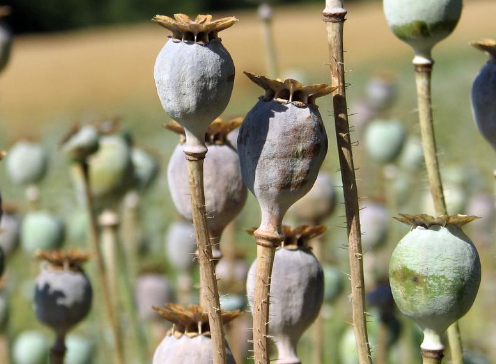Manipur Reports 60% Decline in Opium Poppy Cultivation
Manipur Chief Minister N Biren Singh has announced a significant victory in the state’s fight against opium poppy cultivation, with a 60% decrease in the cultivation area over the three-year period from 2021 to 2024, based on a report by the Manipur Remote Sensing Applications Centre (MARSAC).
This achievement is credited to the support of the masses towards the War on Drugs campaign aimed at protecting the youth of the state. Chief Minister Singh took to social media to highlight the success of the campaign, emphasizing the collaborative efforts to combat drug cultivation in Manipur.
The MARSAC report indicates a notable reduction in opium poppy cultivation in districts like Kangpokpi, Churachandpur, and Senapati, formerly known for such activities. The total cultivation area decreased from 28,599 acres in 2021-22 to 16,890 acres in 2022-23. District-specific data from MARSAC shows decreases in opium poppy cultivation across Manipur, including significant drops in Kangpokpi, Churachandpur, and Senapati. Other districts like Chandel, Kamjong, Ukhrul, Tengnoupal, Noney, and Tamenglong also experienced reductions in opium poppy cultivation, indicating widespread impact of the state’s anti-drug initiatives.
About opium poppy cultivation
Opium poppy (Papaver somniferum) cultivation refers to the process of growing the flowering plant known as the opium poppy, from which opium is derived from unripe seedpods of the plant. Globally, the cultivation is mostly concentrated in countries like Afghanistan, Myanmar, and Laos. The opium poppy plant has been used for centuries to produce opium, which is the main ingredient in drugs such as heroin. The cultivation of opium poppies is illegal in many countries due to its association with the illegal drug trade and the negative impact it has on communities and individuals.
Reasons Behind Poppy Cultivation in Manipur
Economic Desperation and Lack of Viable Alternatives
Many farmers in Manipur turn to poppy cultivation primarily due to economic necessity. Manipur, with its remote and rugged terrain, offers limited agricultural and employment opportunities. The high profitability of poppy compared to traditional crops like rice or vegetables appears as a lucrative option for many impoverished families. Despite its illegal status, the robust local and cross-border demand for opium makes poppy cultivation an attractive, albeit risky, endeavour.
Impact of Geographical Proximity and Historical Context
Manipur’s proximity to the Golden Triangle—an area well known for its opium production—significantly influences the persistence of poppy cultivation. The easy access to lucrative smuggling routes incentivizes the cultivation of poppy despite the associated legal risks. Historically, the region’s involvement in the opium trade and the lack of stringent enforcement mechanisms have allowed this practice to embed itself deeply within some local communities.
Proposed Solutions and Government Efforts
Government of Manipur and associated agencies have attempted to introduce other forms of agriculture, such as cardamom and lemongrass cultivation. Efforts include combining these initiatives with economic incentives, technical training, and market access. However, for any alternative to be viable, it must compete with the income levels that poppy cultivation can offer.
Month: Current Affairs - April, 2024
Category: States Current Affairs



